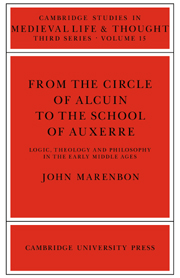 From the Circle of Alcuin to the School of Auxerre
From the Circle of Alcuin to the School of Auxerre Published online by Cambridge University Press: 24 October 2009
The circle of pupils which Alcuin gathered round him at the court of Charlemagne provided the setting for the first attempts in the medieval West to assimilate the techniques of logic and apply them to theology. In particular, the scholars of Alcuin's circle had to take measure of the problems concerning essence and the Categories which they inherited from the Schools of Antiquity and the Fathers. Historians have not been flattering in their estimates of the philosophical activity carried on at Charlemagne's court: the most charitable commend Alcuin for his part in introducing various logical texts into the curriculum, but they are unanimous in declaring that he was not at all a thinker in his own right. And a writer as learned as Grabmann is willing to extend this judgement to the age as a whole. Charlemagne's, he suggests, was a time of intellectual ‘hyperconservatism’, in which philosophy could be conducted only as a slavish imitation of past thinkers.
This low estimate of Alcuin's philosophy is misleading only in that it posits a crude distinction between the assimilation of old material and the creation of new ideas. Nowhere in the works certainly attributed to him does Alcuin put forward an argument that is original and striking. Yet in his choice and juxtaposition of second-hand material he reveals a mind clear and resolved in its purpose. His works against the Adoptionist heresy efficiently marshal the patristic testimonies for his case.
To save this book to your Kindle, first ensure [email protected] is added to your Approved Personal Document E-mail List under your Personal Document Settings on the Manage Your Content and Devices page of your Amazon account. Then enter the ‘name’ part of your Kindle email address below. Find out more about saving to your Kindle.
Note you can select to save to either the @free.kindle.com or @kindle.com variations. ‘@free.kindle.com’ emails are free but can only be saved to your device when it is connected to wi-fi. ‘@kindle.com’ emails can be delivered even when you are not connected to wi-fi, but note that service fees apply.
Find out more about the Kindle Personal Document Service.
To save content items to your account, please confirm that you agree to abide by our usage policies. If this is the first time you use this feature, you will be asked to authorise Cambridge Core to connect with your account. Find out more about saving content to Dropbox.
To save content items to your account, please confirm that you agree to abide by our usage policies. If this is the first time you use this feature, you will be asked to authorise Cambridge Core to connect with your account. Find out more about saving content to Google Drive.